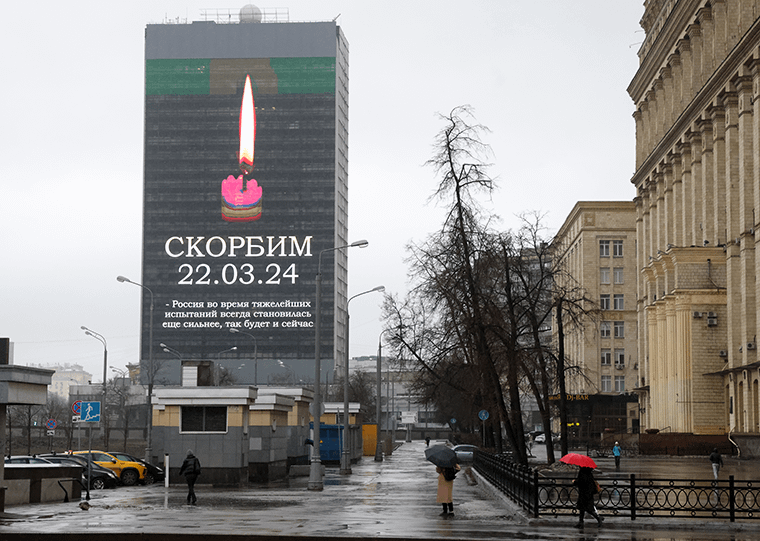16.07.2024
Moscow Attack: Russia Confronts Islamist Terrorism
Interview
26 mars 2024

The attack on Friday 22 March by the Islamic State group in Khorassan on a concert hall in Moscow reminded the Russian authorities of the Islamic threat to Russia since the Afghan War and the wars in Chechnya. Why has Russia been hit? What are the possible geopolitical repercussions of this attack? How is the jihadist threat developing in Central Asia? Interview with Jean de Gliniasty, Senior Resarch Fellow at IRIS and former French ambassador to Russia, specialising in Russian issues.
The attack carried out on Friday 22 March by a terrorist commando affiliated to Daech at the Crocus City Hall in Moscow left 140 people dead and 300 injured. Why was Russia targeted? What are the precedents between Russia and Islamist terrorism? How does this attack highlight the shortcomings of the Russian intelligence services?
During the war in Afghanistan (1979-1989), Russia came up against Afghan Islamists armed in particular by the United States, some of whom became al-Qaeda. Then the Chechen wars (1996 and 2000) saw Chechen nationalism transformed into Caucasian jihadism (the « Caucasus Emirate ») directed against Russia. Then in Syria, Russia clashed with Daesh. The American withdrawal from Afghanistan sparked a full-scale war between the Taliban and Daesh, and Moscow’s relatively good relations with the Taliban made Russia a target. It should come as no surprise that since the first Chechen war, there has been a succession of attacks against Russians by jihadists, with the Doubrovka Theatre (over 150 dead, including 130 hostages in 2002) and the Beslan School (334 dead, including 186 children in 2004) peaking. There have been numerous bloody jihadist attacks on a regular basis, notably at airports and in the Moscow and St Petersburg metros, with dozens of deaths. The last attack organised by Daesh in September 2022 targeted the Russian Embassy in Kabul, killing ten people. The ongoing risk of jihadist attacks is taken into account by the Russian authorities but, despite warning signs, it is difficult to predict the day, time and place of the attack, and the war in Ukraine is mobilising the efforts of the security services and no doubt reducing their vigilance against jihadists. In any case, despite an initial show of solidarity with the authorities, the attack on Crocus Hall and its 140 dead will be blamed on a failure of security and therefore of the government.
The attack, for which the Islamic State in Khorassan has claimed responsibility on several occasions, is being used by the Kremlin to fuel its anti-Ukraine narrative. Does the public support this version? What repercussions might this attack and Vladimir Putin’s statements have in the war between Kiev and Moscow?
President Putin’s priority is his war in Ukraine and the attack has been used to accuse Kiev of complicity (the flight of terrorists to Ukraine), thereby legitimising an intensification of military measures in Ukraine and increased repressive measures at home. The possibility of greater solidarity with the Western world in the fight against jihadism took second place, as we saw with the disdainful rejection of American warnings – a rejection that no doubt did not prevent the Russians from taking action and foiling a planned attack on a mosque in Moscow shortly afterwards. But after forty-eight hours, Putin admitted that the perpetrators of the attack were Daesh jihadists, without ruling out Ukrainian complicity. It was difficult for him to do otherwise, because Westerners, world opinion and the Russians themselves knew what they were dealing with, especially after the communiqués from the Islamic State of Khorassan claiming responsibility for the terrorist action.
The four suspects arrested and brought before a judge are believed to be from Tajikistan. What is the current state of the jihadist threat in Central Asia and the Caucasus?
The terrorist threat in the Caucasus is constant, because the war in Chechnya has left its mark on the whole region and there are many « returnees » from the war in Syria after the defeat of Daesh. In Central Asia, Russia deplored the brutal withdrawal of the Americans from Afghanistan and the resulting vacuum that threatened to destabilise the region. Tajikistan is particularly vulnerable because the regime has banned the Islamic Renaissance Party, despite the fact that it was a party to the agreements that put an end to five years of civil war in 1997, and its members have gone underground. Many Tajik jihadists have returned from Syria, and the long border with Afghanistan is ideal for infiltration. More generally, extremist Muslim movements and the jihadists of the Islamic State of Khorassan are stirring up populations throughout Central Asia, prompting governments to be more vigilant, police and intelligence cooperation with Russia and China, particularly within the Shanghai Cooperation Organisation (SCO), and, more often than not, an increase in authoritarianism. But the combination of Islamic references, secular elites and authoritarian regimes in the region makes Central Asia particularly vulnerable to jihadists.
Translated by Deepl.